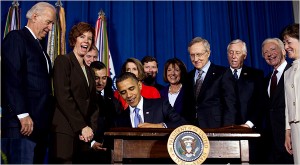from the New York Times; written by: Benjamin Weiser
President Obama has nominated a former Clinton administration lawyer to be a federal judge in Manhattan; he could become the first openly gay man to serve on the federal bench in the United States.
The lawyer, J. Paul Oetken, 45, is a senior vice president and associate general counsel of Cablevision.
He is one of two openly gay men whose nominations are pending to the federal courts. The other is Edward C. DuMont, a lawyer who has been nominated to the Court of Appeals for the Federal Circuit in Washington.
Mr. Oetken was originally recommended to the White House in September by Senator Charles E. Schumer, who described him as having “sterling legal credentials” and a “distinguished career in private practice and public service.”
His nomination on Wednesday came about a year after Mr. Schumer recommended that the president nominate Daniel S. Alter, a former assistant United States attorney in Manhattan, who is also openly gay, to the same court.
But Mr. Alter was not nominated. He has said he believes it was because of statements attributed to him relating to the use of the term “Merry Christmas” and to the Pledge of Allegiance, which he denied having made.
Senator Schumer said on Thursday that Mr. Oetken fit his three criteria for federal judges: legal excellence, moderation of views and diversity.
“I am looking for people who fit the three criteria, and I was shocked to learn there were no openly gay male judges on the entire federal bench.” Mr. Oetken “fit the bill,” he added.
Mr. Oetken, a graduate of the University of Iowa and Yale Law School, was a law clerk to Supreme Court Justice Harry A. Blackmun and worked in the Justice Department and in the White House counsel’s office.
Before joining Cablevision, Mr. Oetken was in private practice in New York.
If confirmed by the Senate, Mr. Oetken, who lives in Manhattan, would fill the slot previously held by Judge Denny Chin, who has been elevated by President Obama to the federal appeals court in Manhattan.
Mr. Schumer declined to comment on the matter involving Mr. Alter, whose recommendation he announced last February at a dinner of the Human Rights Campaign, a national gay rights group. At the time, he called Mr. Alter “a brilliant attorney,” adding that he would be “a history-maker who will be the first openly gay male judge” nominated to the federal bench.
Mr. Alter, a graduate of Columbia and Yale Law, was an assistant United States attorney and later national director for civil rights for the Anti-Defamation League.
Mr. Alter declined to comment on Thursday, but told The New York Law Journal in October that his nomination appeared to have run into trouble because of “certain false attributions” to him of statements that he denied making.
The Washington Blade had earlier reported that Mr. Alter, while working for the Anti-Defamation League, was quoted in a news service article as recommending against merchants using “Merry Christmas” instead of a more generic greeting and in remarks in a magazine suggesting the group favored legal challenges to the use of “under God” in the Pledge of Allegiance.
Mr. Alter told The Law Journal: “Neither of the quotations attributed to me are accurate or in any way reflect my personal reviews.” The White House has declined to comment on the issue.
Last summer, 66 of his former colleagues in the United States attorney’s office wrote to Mr. Schumer, urging the senator to fight for his nomination.
“We stress that if Mr. Alter’s nomination were derailed by these false allegations, the loss to the federal judiciary and to the public would be significant,” the letter said. The signers included two former United States attorneys, James B. Comey and David N. Kelley; Mr. Comey was later a deputy attorney general in the Bush administration.
Another of the signers, Gideon A. Schor, said on Thursday that the failure of Mr. Alter to be nominated “was crushing.”
“It was a real loss, I think, for the public and the bench and the lawyers and the parties,” he said, adding, “For all of our sakes, I hope he gets another chance.”
The Original Article can be found at this link:
http://www.nytimes.com/2011/01/28/nyregion/28judge.html?smid=tw-nytimes

 WASHINGTON — The military’s longstanding ban on service by gays and lesbians came to a historic and symbolic end on Wednesday, as
WASHINGTON — The military’s longstanding ban on service by gays and lesbians came to a historic and symbolic end on Wednesday, as